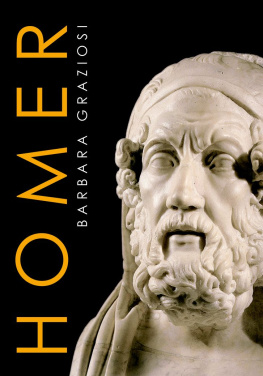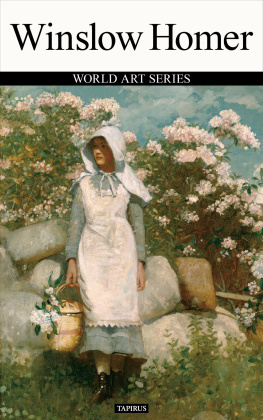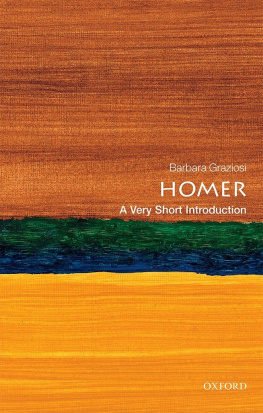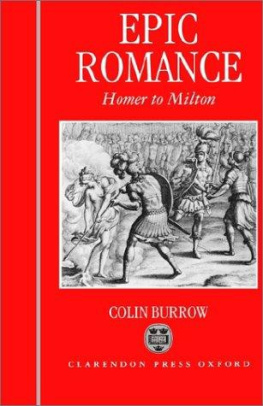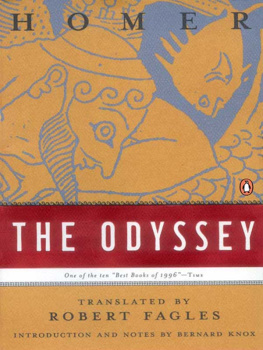Barbara Graziosi - Homer
Here you can read online Barbara Graziosi - Homer full text of the book (entire story) in english for free. Download pdf and epub, get meaning, cover and reviews about this ebook. City: Oxford, year: 2016, publisher: Oxford University Press, Incorporated, genre: Art. Description of the work, (preface) as well as reviews are available. Best literature library LitArk.com created for fans of good reading and offers a wide selection of genres:
Romance novel
Science fiction
Adventure
Detective
Science
History
Home and family
Prose
Art
Politics
Computer
Non-fiction
Religion
Business
Children
Humor
Choose a favorite category and find really read worthwhile books. Enjoy immersion in the world of imagination, feel the emotions of the characters or learn something new for yourself, make an fascinating discovery.
- Book:Homer
- Author:
- Publisher:Oxford University Press, Incorporated
- Genre:
- Year:2016
- City:Oxford
- Rating:5 / 5
- Favourites:Add to favourites
- Your mark:
- 100
- 1
- 2
- 3
- 4
- 5
Homer: summary, description and annotation
We offer to read an annotation, description, summary or preface (depends on what the author of the book "Homer" wrote himself). If you haven't found the necessary information about the book — write in the comments, we will try to find it.
Homer — read online for free the complete book (whole text) full work
Below is the text of the book, divided by pages. System saving the place of the last page read, allows you to conveniently read the book "Homer" online for free, without having to search again every time where you left off. Put a bookmark, and you can go to the page where you finished reading at any time.
Font size:
Interval:
Bookmark:

Homer has flourished through millennia of cultural receptions, ending up (as Nietzsche noted) more like an aesthetic judgment than an historical fact. Barbara Graziosi in this highly readable, svelte volume offers a lucid and learned introduction that is characteristically attuned to key moments in the afterlife of the Iliad and Odyssey. Not only do we get a sensitive and fresh survey of the poems themselves and their ancient contexts (including roots in oral tradition, relationships with Near Eastern literature, and the evidence for a Trojan War). She also renews our awareness of the later impact of this earliest Greek literature, from Vergil to Primo Levi. Rich in detailed readings and packed with hints for further exploration, Graziosis book provides the most up-to-date and reliable guide to the appreciation of two eternally relevant epics.
Richard P. Martin, Antony and Isabelle Raubitschek Professor in Classics, Stanford University
This book rewards the general reader with a lively introduction to Homeric poetryand to the artistic world in which this poetry originally came to life. Throughout her forceful exposition, the author does not hesitate to track her own critical views on the lasting value of reading Homer in our own time.
Gregory Nagy, Francis Jones Professor of Classical Greek Literature, Harvard University, and Director of the Harvard Center for Hellenic

Great Clarendon Street, Oxford, OX2 6DP, United Kingdom
Oxford University Press is a department of the University of Oxford. It furthers the Universitys objective of excellence in research, scholarship, and education by publishing worldwide. Oxford is a registered trade mark of Oxford University Press in the UK and in certain other countries
Barbara Graziosi 2016
The moral rights of the author have been asserted
First Edition published in 2016
Impression: 1
All rights reserved. No part of this publication may be reproduced, stored in a retrieval system, or transmitted, in any form or by any means, without the prior permission in writing of Oxford University Press, or as expressly permitted by law, by licence or under terms agreed with the appropriate reprographics rights organization. Enquiries concerning reproduction outside the scope of the above should be sent to the Rights Department, Oxford University Press, at the address above
You must not circulate this work in any other form and you must impose this same condition on any acquirer
Published in the United States of America by Oxford University Press 198 Madison Avenue, New York, NY 10016, United States of America
British Library Cataloguing in Publication Data
Data available
Library of Congress Control Number: 2016935485
ISBN 9780198788300
ebook ISBN 9780191092497
Printed in Great Britain by Clays Ltd, St Ives plc
Links to third party websites are provided by Oxford in good faith and for information only. Oxford disclaims any responsibility for the materials contained in any third party website referenced in this work.
This book was written while directing a research project entitled Living Poets: A New Approach to Ancient Poetry . I am grateful to the European Research Council for funding that project, and thus giving me and others the opportunity to investigate how, through the centuries, readers imagined the poets of Greece and Rome, and how in turn the biographies and portraits they produced served as introductions to the poets works. I am grateful to Oxford University Press, and specifically commissioning editor Andrea Keegan, for giving me the opportunity to introduce Homer to readers today, starting with how he was imagined.
I would like to thank the anonymous peer reviewers for their expertise and encouragement: their comments improved the book in many ways. I have also benefitted from discussing Homer with Johannes Haubold over the years: many of the views presented here are the result of those conversations. Reading the Iliad and the Odyssey with students has been an important source of pleasure and insight, and proved especially useful when planning this book. David Elmer helped me track down the photograph on p. 16. Massimo Brizzi drew the maps on pp. 35 and 48. Kim Birchall prepared the Index and Mohana Annamalai oversaw production. I am very grateful for their expertise and patience. Emma Ma and Jenny Nugee at Oxford University Press offered unfailing support during the exceedingly long gestation of this very short book.
In 1354, Petrarch received a manuscript of the Iliad from a Byzantine correspondent, and wrote to him in acknowledgement:
Your Homer is mute to me. Or rather, I am deaf to him. Still, I rejoice even to look at him and often, as I embrace him, I say, sighing, O Great Man, how ardently would I listen to you!
With this paradoxical love for an author he could not read, Petrarch set in motion an intellectual movement of vast proportions: the recovery of ancient Greek literature shaped the Renaissance, or rebirth of antiquity, and this early declaration of love for Homer was one of its symbolic beginnings.
Petrarch did not content himself with hugging his incomprehensible Homeric manuscript, but looked for a scholar who could translate it, and teach him Greek along the way. He also helped to persuade the City Fathers of Florence to establish the first chair of Greek in Western Europe. Unfortunately, the man chosen for the position, Leontius Pilate, proved to be unsuitable. Petrarchs letters reveal something of the impression he made: stubborn, vain, volatile, badly dressed. As disastrous academic appointments go, that of Leontius Pilate must rank among the worst in historyand yet the slow uptake of Greek in Western Europe was not just a result of his poor manners or dress sense. Petrarch shared with his Italian contemporaries an attitude of suspicion and superiority towards Byzantine culture, which was not conducive to language acquisition. He was more interested in making contact, directly, with Homer, than in learning the intricacies of Greek grammar.
Today, Homers poems are easily accessible. A list of translations, published in 2003, runs to hundreds of pages, and includes all major modern languages, as well as Esperanto and several dialects and forms of patois. There are also countless grammars, commentaries, dictionaries, encyclopaedias, monographs, articles, and digital resources which greatly facilitate access to the Iliad and the Odyssey in the original Greek. Last but not least, there are many excellent teachers. And yet people today often find themselves in a position which resembles that of Petrarch: they assume that Homer is a great poet, but have not read any of the poetry attributed to him. Homeric epic still reaches us primarily through echoes and refractions in other poems, novels, plays, and works of artas well as through the ubiquitous myth of the author, since everybody knows that there is a question about the identity, and even existence, of Homer himself.
Given the situation, this book has two main aims. The first is to facilitate an understanding of the Iliad and the Odyssey, by providing a succinct and up-to-date guide to the main literary, historical, cultural, and archaeological issues at the heart of Homeric studies. The second is to show, by way of concrete example, how readers of Homer join a vast and diverse community of other readers and, indeed, non-readers (like Petrarch).
Font size:
Interval:
Bookmark:
Similar books «Homer»
Look at similar books to Homer. We have selected literature similar in name and meaning in the hope of providing readers with more options to find new, interesting, not yet read works.
Discussion, reviews of the book Homer and just readers' own opinions. Leave your comments, write what you think about the work, its meaning or the main characters. Specify what exactly you liked and what you didn't like, and why you think so.

